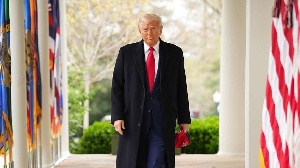- Home - News
- Elections 2024
- News Archive
- Crime & Punishment
- Politics
- Regional
- Editorial
- Health
- Ghanaians Abroad
- Tabloid
- Africa
- Religion
- Photo Archives
- Press Release
General News of Tuesday, 8 April 2025
Source: www.ghanawebbers.com
Trump game of chicken over tariffs leaves world guessing
A day before Donald Trump's "reciprocal" tariffs start, tensions rise. The world's economy hangs in the balance.
Some nations labeled as "worst offenders" are trying to appease the White House. They want to avoid a potentially devastating outcome.
China is taking a different approach. It is retaliating and resisting Trump's actions.
Trump continues his course despite concerns from allies in Congress and Wall Street. When asked about market drops, he dismissed the question as "stupid."
Is this a negotiating tactic or a long-term strategy? Many wonder if Trump aims to restructure the global economy based on favorable deals.
On Monday afternoon, Israeli Prime Minister Benjamin Netanyahu visited Trump. He pledged that Israel would drop trade barriers and eliminate its surplus with the US.
Netanyahu stated, "We think it is the right thing to do." He believes Israel can serve as a model for other countries.
Other nations are adopting similar strategies for positive outcomes. Japanese Prime Minister Shigeru Ishiba called Trump on Monday morning.
Treasury Secretary Scott Bessent announced negotiations with Japan for a new trade vision. European Commission President Ursula von der Leyen also expressed readiness to negotiate with the US.
She proposed reducing tariffs on industrial goods to zero. Trump praised this offer but said it was still "not enough."
China's response was stark. On Monday morning, it announced an additional 34% tariff increase in retaliation.
Trump threatened another 50% increase if China does not back down by Tuesday. Bessent remarked that China has isolated itself through its actions.
He noted that over 50 countries have responded positively to Trump's trade initiatives.
China's reaction was firm. A spokesperson stated that pressuring China is not an effective approach.
Investors feared these escalating tensions last week, leading to significant stock market drops. By Monday, many business leaders voiced opposition to Trump's tariff plan.
US markets were eager for any sign of hope. A social media post suggested a possible delay on new tariffs, causing stock indexes to soar briefly.
However, this optimism vanished when the White House denied any delay plans. Trump confirmed there would be no postponement of tariffs and emphasized moving forward quickly.
"We're going to have one shot at this," he declared firmly.
One concerning message came from Peter Navarro, one of Trump's top trade advisers. He wrote that this situation is not merely a negotiation but rather a serious commitment from Trump.
Navarro warned world leaders offering lower tariffs that it's just the beginning of their obligations.
If this represents broader systemic change, what could be the ultimate goal? Some speculate it involves weakening the US dollar internationally through strategic agreements known as the "Mar-a-Lago accord."
This plan could make American exports cheaper abroad while diminishing China's currency reserves in dollars. Stephen Miran supports this idea but denies it's official policy of the administration.
This theory explains some current market chaos instigated by Trump’s actions—though many economists warn it's risky territory.
Since announcing his sweeping tariff plan, White House officials have offered mixed messages about their strategy: raising revenue or protecting American industry; permanent or temporary tariffs; individual deals or grand agreements are all possibilities being discussed.
As Trump approaches Wednesday's deadline without signs of retreating, uncertainty remains high globally.











